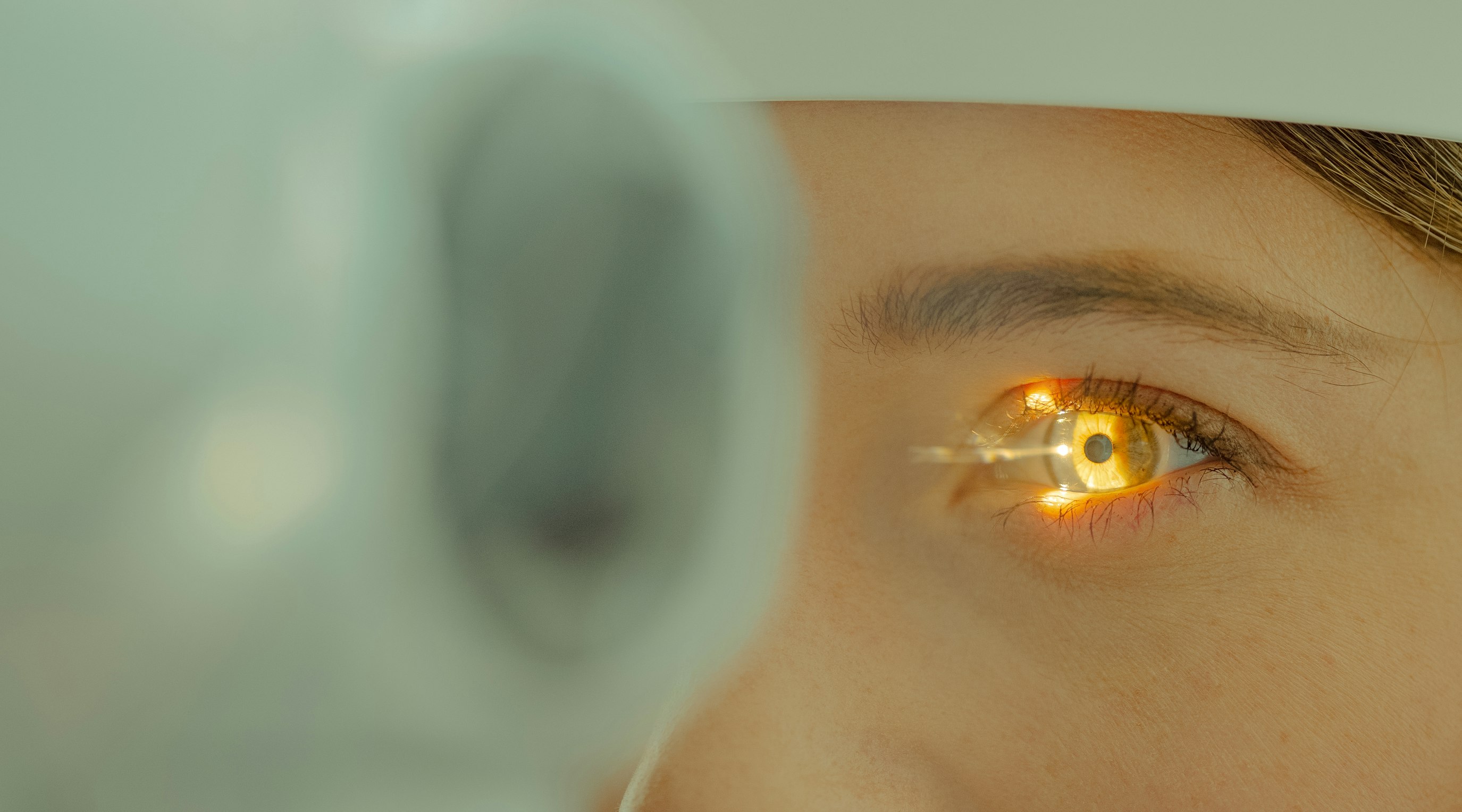Can CBD help manage the symptoms of glaucoma?
7 min read
Sam North
Contents
While there is research to show that cannabinoids may offer certain medicinal benefits to glaucoma sufferers, there is a need for more in-depth research on whether CBD alone can help manage the condition.
Let’s have a look at the currently available literature on the effects of CBD on glaucoma, and discuss the potential that CBD may have in future treatments alongside traditional treatment methods.
What is glaucoma?
Glaucoma is the term for a collection of eye conditions that can cause optic nerve damage, ultimately leading to visual loss or, in severe cases, total blindness. As glaucoma is the overall umbrella term, it can therefore be categorised into further groups depending on the individual's age, the likely cause, the rate of progression, and the status of the anterior chamber angle.
NICE states that Primary Open Angle Glaucoma (POAG) is the most common form, which generally affects the over 40 population. It usually has a slow, gradual onset, and impacts both eyes. It occurs due to faulty drainage of fluid within the eye, which causes an increase in pressure within the eye. Furthermore, it is this increased pressure which can damage the optic nerve and surrounding structures. Mostly, POAG gives no symptoms during early onset, with no visual changes or pain.
Primary Angle Closure Glaucoma (PACG) is similar to POAG in that it is due to lack of fluid drainage, however, this is due to anatomical reasons, and not a faulty drainage system. Individuals with small eyes, who are long-sighted, and even certain ethnic origins, are at risk of having narrower drainage angles in the eye. This can be chronic (long-term) or acute (fast developing), and can generally be picked up at your routine eye test.
Acute Primary Angle Closure is an urgent condition which requires assessment immediately by an eye specialist. This can occur when the eye has a very sudden blockage that develops very quickly, raising the pressure within the eye too fast. This can cause intense pain, severe headache, visual disturbance and nausea. An eye doctor needs to administer specialist treatment to reduce the pressure in the eye, otherwise, permanent visual loss will occur.
Secondary glaucoma can develop, this is usually classed as a side effect or has been caused by a primary condition. Examples of this could be due to medication such as steroids or inhalers causing inflammation in the eye, raising the pressure, individuals who are diabetic with poor blood flow and new blood vessels growing again causing an increase in pressure in the eye, and even traumatic injury or surgery.
And finally, there is Developmental Glaucoma. This only affects babies and has two causes. Usually, either a birth defect where the eye hasn't developed properly during pregnancy, leading to poor drainage of fluid. This can have a genetic link in families. Or this can be due to the child suffering from certain conditions where this is a secondary symptom.
CBD and Glaucoma
What is CBD?
CBD, or cannabidiol, is a phytocannabinoid (meaning a cannabinoid not produced by the body) found in both hemp and cannabis. While these are technically the same plant species, hemp plants contain minimal amounts of THC, the intoxicating compound in cannabis. Just one of more than 100 cannabinoids produced by cannabis, it is typically extracted from the plant before being formulated into edibles, oils, tinctures, concentrates and other products.
How does CBD work?
Cannabinoids, CBD included, are one of the group of chemical compounds produced by cannabis that interact with our body’s endocannabinoid system (ECS). It is thought that, unlike THC, which interacts directly with the ECS receptors, CBD may work by slowing or preventing the breakdown of the body's own cannabinoids (endocannabinoids), allowing for more interactions between the body’s own cannabinoids and the ECS receptors.
How can CBD help with glaucoma?
Again, as mentioned in the intro, there needs to be more research completed before we can make any definitive claims in relation to how CBD may or may not help reduce the symptoms of glaucoma, but there is some promising evidence that is beginning to emerge.
One of the most common treatments for glaucoma is the use of intraocular pressure-lowering drugs. There have been several studies showing that cannabis administration may have a marked positive effect on this by reducing the amount of aqueous humour within the eye and with the level of immune cell migration and general eye inflammation. This inflammation is a major cause of the discomfort felt by glaucoma patients.
There is also evidence pointing to the fact that cannabis ingestion could have a therapeutic effect on corneal surface damage and pain.
How to take CBD for glaucoma
If you are considering implementing CBD into your current treatment plan, you first need to seek medical advice. Talking to your doctor is essential, as they will be able to advise you on the safest and most effective course of action.
What the science does appear to show is that a product with balanced levels of both THC and CBD seems to work best for glaucoma symptoms. One study pointed to the fact that THC may very well lower intraocular pressure and may even be more effective than current treatment options with fewer side effects.
Other benefits of CBD
While sometimes touted as the next wonder drug, CBD is not a miracle cure. You should be wary of any company making outrageous claims about what CBD can do without the backing of peer-reviewed research backing such suggestions.
That said, there is a growing body of evidence pointing to the fact that regular ingestion of CBD may help with a wide range of issues people face day to day, as well as more serious ailments. From your everyday inflammation and pain relief, to a potential reduction in Parkinson's disease-related tremors, MS, the possible ability to help in cancer symptom management. It also may help reduce anxiety rates and severity.
In the United Kingdom, at the time of writing, CBD is present in only two available pharmaceutical options. Sativex is an oral spray that is prescribed for cancer patients to help alleviate the side effects of chemotherapy and Epidyolex which is administered to help treat seizures.
Does CBD come with any risk factors?
One obvious risk is the fact that, right now, many of the CBD products available originate from unregulated sources. This means that you don’t know exactly what is in them and this could lead to unwanted side effects, or the product not containing the level of CBD stated on the packaging. If you are considering using CBD for any condition, always buy from a reputable source.
Conclusion
CBD is one of the more exciting all-natural treatment options t in recent years. Most of the research so far has been on animals, but with the laws and social climate surrounding cannabis shifting towards a more open future, we can expect to see more extensive research with human subjects taking place soon.
In terms of glaucoma and exactly how CBD (and other cannabinoids) may help, there are still many questions to be answered. The early signs point to a possible role for CBD in terms of the symptomatic relief of glaucoma.
Releaf understands the importance of medical cannabis in treating various medical conditions. With our tailored monthly packages, specialist consultations for medical cannabis, and a unique medical cannabis card for protection, you can access the treatment you need without worrying about the stigma.
Share article
Did you like this article?
It is important to seek medical advice before starting any new treatments. The patient advisors at Releaf are available to provide expert advice and support. Alternatively, click here to book a consultation with one of our specialist doctors.
Elevate your wellness with medical cannabis
Get comprehensive care, convenience, and confidence with an all-in-one treatment plan.
Am I eligible?Authors
Sam North, a seasoned writer with over five years' experience and expertise in medicinal cannabis, brings clarity to complex concepts, focusing on education and informed use.
meet our specialist
Editorial Policy
All of our articles are written by medical cannabis experts, guided by strict sourcing guidelines, and reference peer-reviewed studies and credible academic research. Our expert clinical team and compliance specialists provide valuable insights to ensure accuracy when required. Learn more in our editorial policy.
Need more help?











